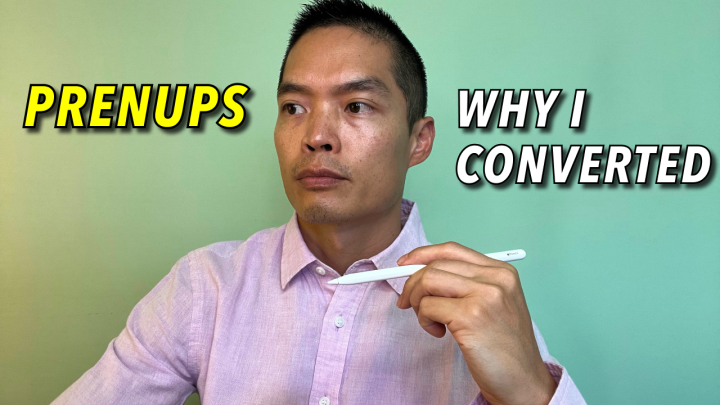What’s the leading cause of divorce?
Marriage!
* slaps knee
Group trips are the best time to ask random questions and hypotheticals. On such a trip, years ago, a friend posed this question to the group: what do you think of prenups?
It sparked quite a debate that divided the room.
Half my friends (ok, mostly ladies) argued that prenups were not romantic and registered as “planning to fail.”
The other half (ok, mostly men) argued that prenups were practical.
I didn’t have much of an opinion on the topic at the time.
Flash forward to present-day. Luckily I found my life partner and so I’ve been thinking more deeply about marriage.
This led me to Aaron Thomas and James Sexton, two lawyers who’ve seen thousands of divorces and have the best advice I’ve seen about marriage. They’ve completely changed the way I think about prenups.
I’ll start with the top 3 reasons to get a prenup, which you can navigate to with the jump links below.
- Reason 1: you get a prenup by default anyway
- Reason 2: marriage today is a corporate merger, not a startup
- Reason 3: why divorces are so expensive
Then, I’ll conclude with a miscellaneous list of other lessons I learned about prenups.
Reason #1 to get a prenup: the state gives you one anyway
Let’s say there are 2 legal documents that determine you and your partners’ finances:
- A document created by a random stranger with zero understanding about you and your partner.
- A document fully customized by you and your partner.
The first document is the “default” prenup you get according to your state’s family and marriage laws.
For Californians, this is defined by the California Family Code. Left to community property laws, you can assume that all assets will be divided 50/50 in the event of divorce.
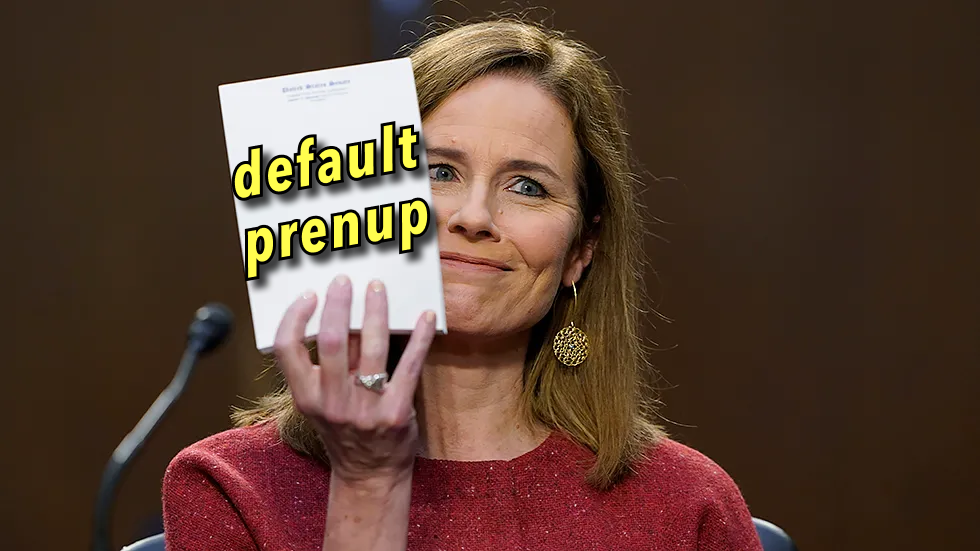
I bet that most people would not want an arbitrary ruling from a judge that doesn’t know them.
A random party who doesn’t care less who gets what.
If you’re like me, you’d prefer to customize before it gets finalized.
If you think: “Well, the default plan should be fine…” then consider how your mind can change once things get more specific.
Scenario: Over 10 years of being together, partner 1 has diligently maxed out their 401K. Meanwhile, partner 2 hates investing. They they get married without a prenup. Years later, they get a divorce. Now, partner 1 has to split half of their retirement account with partner 2 who has refused to save for their retirement.
That hits different, doesn’t it?
Once you get more specific, people start to appreciate the differences between how they and their partners treat money—and a generic, default prenup doesn’t quite cut it.
The idea that “you already have a prenup” is probably the most powerful reframe that should convince couples to consider one.
Reason #2 to get a prenup: Your marriage is probably a corporate merger, not a startup
Americans are getting married older than ever. Data as of 2023 shows the median age at first marriage as 30.2 years for men and 28.4 for women. This is a much later in life compared to the 1950s, when the median age of marriage was 22.5 for men and 20.1 for women.
What does this have to do with prenups?
Marriages of the past operated like startups – a couple started young without much assets, and built their financial lives together.
Today, marriages are more like corporate mergers in which two individuals bring an entire financial life with them into a marriage—assets, debt, and different financial habits.

Older couples with the luxury of startup finances may dismiss prenups as unnecessary because they had less financial differences between them, thus requiring less financial coordination.
Enter today’s world. Your partner has too much crypto and you don’t believe in it. They think you spend too much on DoorDash. You disagree about the number of subscriptions (really, Peacock?!) and monthly budget. One wants to rent and the other wants to buy a house at nosebleed mortgage rates.
When corporations go through mergers, there’s a LOT of due diligence and contracts written up. Same thing with a corporate merger marriage, and the way to handle that is through…a prenup.
* Counterargument: If both parties have extremely similar financial lives and are coming into the marriage 50-50 (rare), then there’s a lot less incentive to get a prenup. Even less incentive if the couple doesn’t want kids, because the division of labor is often tested when childcare is involved.
Reason #3 to get a prenup: couples spend 25% of their net worth on divorce to figure out who gets the remaining 75%
Have you ever wondered why divorce costs so much?
It’s all the legal fees that add up when two parties go back on forth on specific aspects of their financial lives they never discussed before.
Imagine this scenario:
- Person 1: “I had a lot of intangible contributions to the marriage, including childcare. I put my career on pause…”
- Person 1’s lawyer: “Okay, we need to spend time to document that all. I’ll need about 10 hours to review that, which at my rate would be $2500.”
- Person 2: “Well I disagree with my ex partner’s level of contribution. This is what actually happened.”
- Person 2’s lawyer: “Do you have proof or documentation of that? I’ll need about 10 hours to review that, which at my rate is $2500.”
And on and on and on. Divorce lawyers benefit from the couple’s lack of financial alignment upfront, racking up a ton of billable hours in a game of “he said, she said.”

People change when relationships end. The generous woman and the kind man can become different animals at the end of a relationship. Just browse through some threads, like this Quora discussion on prenups.
With the warmth gone, they become incentivized to take as much as they can.
James Sexton says that a prenup avoids this by deciding what’s fair upfront.
“Even if we get to a point where we can’t stand each other, I’m still legally committed to being fair to you at the end.”
In a way, that’s kind of romantic, isn’t it?
Bonus: prenups are not just about divorce—it’s about protection and respect for your partner
Prenups are not an either/or binary of “the wealthier spouse keeps everything / the poorer spouse gets less.”
Prenups recognize and respect the financial lives that each partner brings into a marriage. That includes all their assets and liabilities, their financial habits, and their family dynamics.
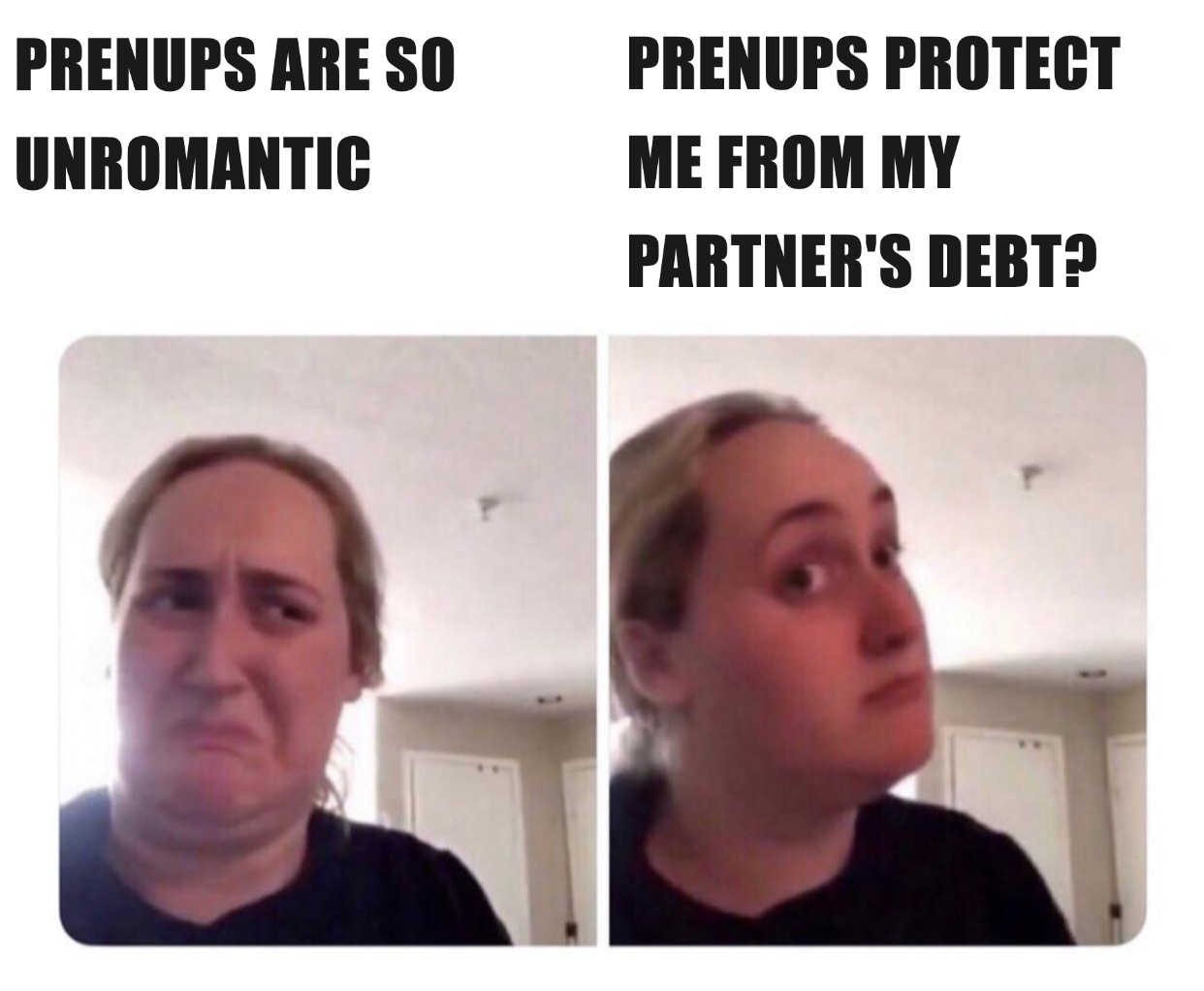
Here are some surprising ways that prenups can protect people:
Debt: separating your assets from marital property can protect you from your spouse’s debt or liabilities. I have a mortgage—when I get married I don’t expect my spouse to pay for that mortgage. That debt was incurred by me.
Since prenups are customizable, offering to take on your partner’s debt can be seen as a sign of goodwill. Prenups officially recognize this level of contribution rather than leave things to be taken for granted.
Inheritances: If my spouse receives an surprise inheritance, I don’t expect to just get half of that. Especially when I’ve had no relationship to that family member.
Catastrophes: Prenups protect your partner against financial catastrophes. A terminally ill partner will not want to leave their surviving partner with crippling medical debt. They’d probably prefer to that take debt to the grave. This also applies to bankruptcies and business failures. Why hurt two people when the damage can be contained to one?
The two divorce lawyers to learn from
I’d start you off with James Sexton’s interview on the Lex Friedman podcast. His crazy stories as a divorce lawyer suggest how to maintain a good marriage, and will also convince you to get a prenup.
Next, here are the books I’d recommend:
The Prenup Prescription by Aaron Thomas
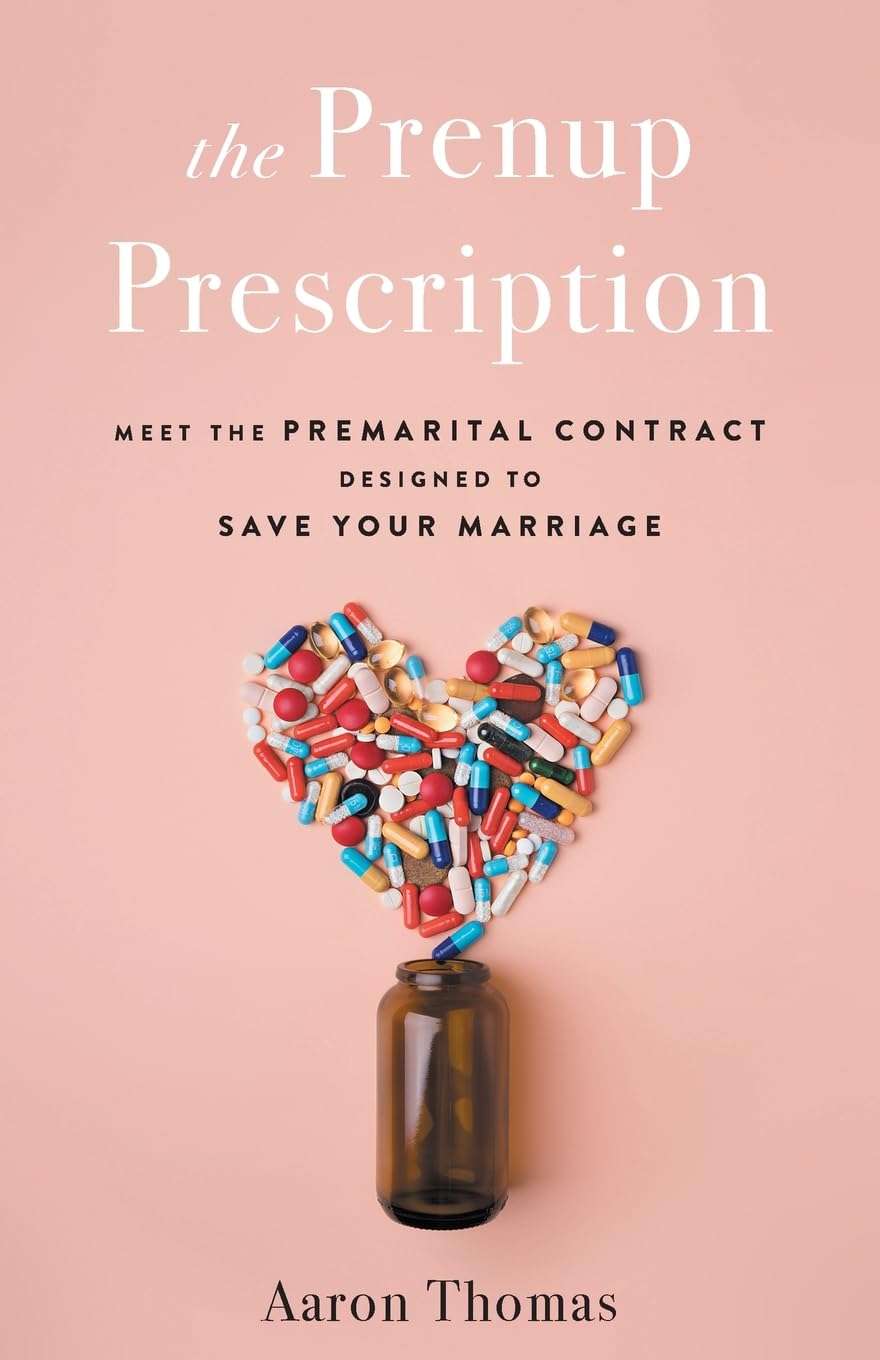
If you’re in my office, it’s already too late by James Sexton
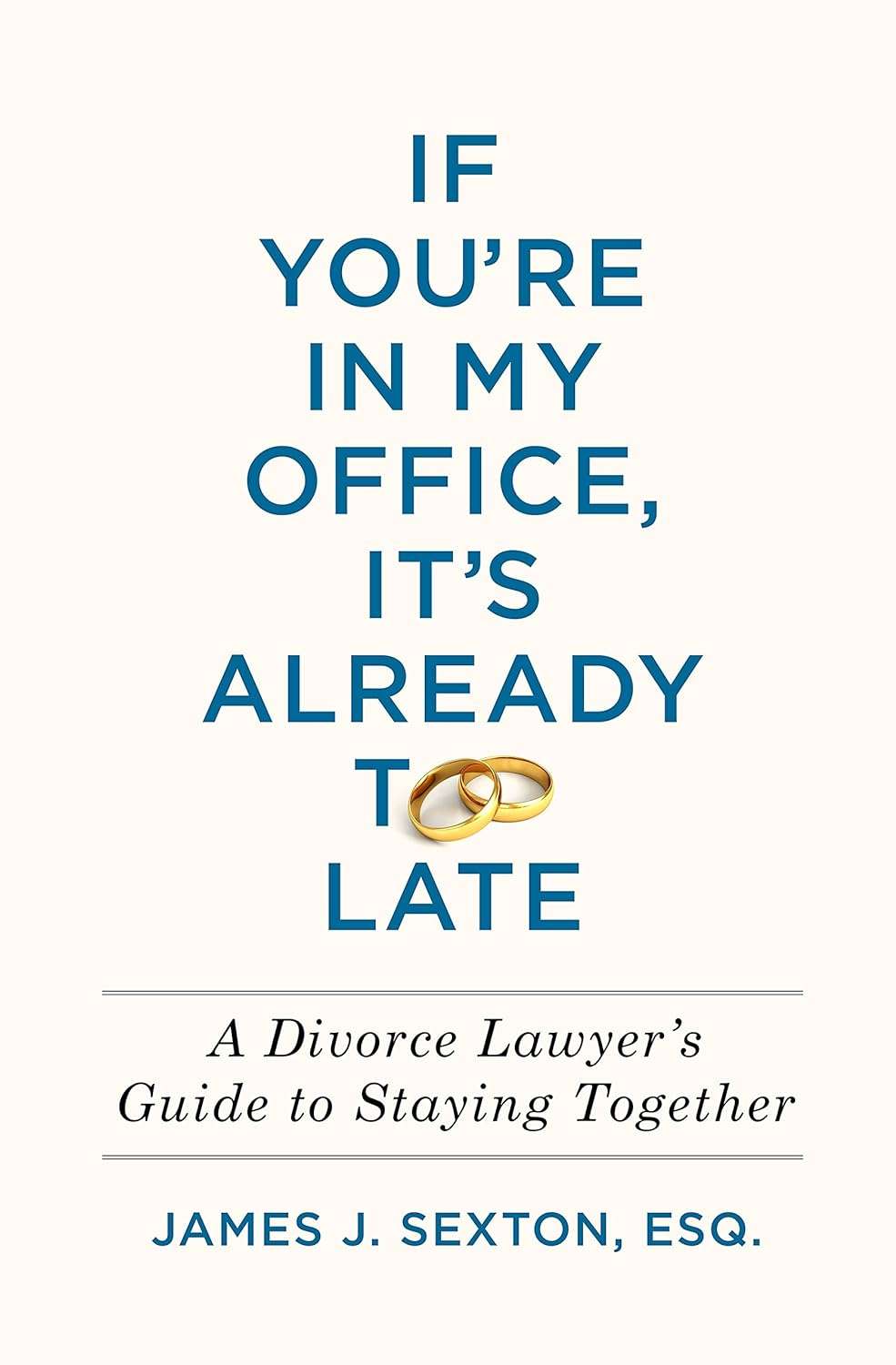
A brain dump of other prenup lessons
- Post-nups are possible in case a married couple doesn’t get to it a prenup on time. It’s emotionally easier to do this as close to marriage as possible; the more that time passes, the more financial things can happen, making the prospect of a prenup seem disproportionately more offensive or suspect. “Why do you want a prenup now?” Just nup it in the bud, friends.
- The best time for a prenup is when you’re still in love. Talk about it early in the relationship and definitely do one before you get married
- People argue that prenups aren’t romantic, but neither is marriage. Both, at the end of the day, is a legal contract.
- The love between you and a partner is ideally strong enough to tolerate unromantic things. That includes doing the dishes, cleaning the toilet, dealing with each other’s quirks, and yes…financial projects like prenups.
- Most people balk at the cost of paying a couple thousand dollars for a prenup, and will easily drop that amount on a wedding DJ or photographer. In relation to the total cost of a wedding, a prenup is relatively cheap.
- Even if you never get a prenup, still take the actions required of a prenup: share exhaustively about each others’ assets and liabilities. Have several money dates and discuss your beliefs and goals about money before getting married.
- Partners in a business have agreements before going into business together. Prenups = partnership agreements: “can we just say what we would think would be fair DURING and after the marriage?”
- Most common financial problems causing divorce:
- One spouse spends other saves > separate money buckets
- Unilateral spending: make big financial decision w/o checking in with partner
- Lack of transparent and communication

